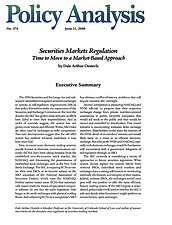The 1934 Securities and Exchange Act and subsequent amendments required securities exchanges to operate as self-regulatory organizations (SROs) that police themselves under the supervision of the Securities and Exchange Commission. But over the decades the SEC has grown more intrusive as SROs have failed to meet their responsibilities. And as cycles of scandals suggest, the system has not grown more honest and efficient. Worse, SRO rules are often used by exchanges to stifle competition. Two new developments suggest that the old SRO system has outlived whatever usefulness it may have once had.
First, in recent years electronic trading systems, usually known as electronic communications networks (ECNs), have been taking business from the established over-the-counter stock market, the NASDAQ, and threatening the preeiminence of established stock exchanges such as the New York Stock Exchange. The SEC is requiring ECNs to create their own SROs or to become subject to the SRO subsidiary of the National Association of Securities Dealers, which runs the NASDAQ. Neither option makes sense. ECNs that automatically match trades by means of specialized computer software do not face the same regulatory challenges as do stock exchanges with physical trading floors. And subjecting ECNs to a competitor’s SRO has obvious conflict-of-interest problems that will require excessive SEC oversight.
Second, competition is pressuring NASDAQ and NYSE officials to propose that their respective exchanges change from private, member-operated associations to public, for-profit companies that would sell stock to the public and thus would be owned and controlled by shareholders. That sound initiative is encountering resistance from exchange members. Shareholders would place the interests of the NYSE ahead of its members’ interests and would likely insist on a move to an efficient electronic exchange. But a for-profit NYSE and NASDAQ, especially with electronic exchanges, would be fundamentally inconsistent with a government delegation of self-regulation through an SRO.
The SEC currently is considering a variety of approaches to future securities regulation. What system should replace the current SROs? Even without SROs, individual stock markets and exchanges have a strong self-interest in monitoring internally the honesty and integrity of their traders. Indeed, without SROs, the exchanges would compete with one another to offer the most efficient, honest trading system. If the SRO regime is abandoned, policymakers will need to redefine the SEC’s role and decide what functions it might perform to ensure honest, open exchanges.
About the Author

This work is licensed under a Creative Commons Attribution-NonCommercial-ShareAlike 4.0 International License.
